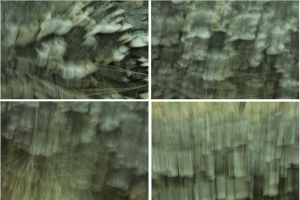
In “Ungrid-able Ecologies,” Natasha Myers will explore what can a queer, feminist, decolonized ecology can reveal about the relationships that develop between species.
Ecology is not just an object of study. It is also a mode of attention to worldly relations. Where the sciences of ecology have traditionally been grounded in teleological, militarized and economizing logics, and bound to heteronormative reproductive imperatives, this talk insists that ecology could be otherwise. It describes my efforts to cultivate a queer, feminist, decolonized ecology within an ancient oak savannah in Toronto’s High Park, a site 10,000 years in-the-making. For millennia these lands were shaped by Aboriginal peoples who used fire to keep the woodlands open for hunting and farming. Today, it is a site of massive ecological restoration efforts in the midst of a bustling city. The aim is to bring back the oak savannah through the use of controlled burns, and the planting of native grasses and wildflowers. But today the oldest oaks are falling and the next generation is just 15 years old.
What modes of attention can help us learn how to pay attention to this remarkable naturalcultural happening which is both in-the-making and coming undone? Working at the cusp of anthropology, art, and ecology, this project interrogates the self-evidence of approaches to conservation ecology and environmental monitoring by throwing open the very question of what it means to pay attention. It proposes an “ungrid-able ecology” to disrupt conventional ecology’s normative, moralizing, and economizing discourses. This ecological practice reconfigures the naturalist’s notebook by innovating techniques for tuning in to the “affective ecologies” and the “involutionary momentum” that propel plants, insects, animals, and people to get involved in one another’s lives (see Hustak and Myers 2012). Through an ongoing collaboration with filmmaker and dancer Ayelen Liberona, this research-creation project experiments with sensory practices that can document the growth, decay, combustion and decomposition that are essential to the life of this remarkable land. In the process, we explore new forms of collaboration to cultivate plant/people relations that are fit for earthly survival.
 Natasha Myers is an associate professor in the Department of Anthropology at York University, the convenor of the Politics of Evidence Working Group, director of the Plant Studies Collaboratory, a member of Sensorium, and on the editorial board of Catalyst. She works alongside Michelle Murphy as co-organizer of Toronto’s Technoscience Salon, and is co-founder of the Write2Know Project with Max Liboiron. Her ethnographic research examines forms of life in the contemporary arts, sciences and ecologies. Her book, Rendering Life Molecular: Models, Modelers, and Excitable Matter (Duke University Press, 2015) is an ethnography of an interdisciplinary group of scientists who make living substance come to matter at the molecular scale. In her new work, she is experimenting with ways to document the affective ecologies that take shape between plants and people, and among plants and their remarkably multi-species affinities.
Natasha Myers is an associate professor in the Department of Anthropology at York University, the convenor of the Politics of Evidence Working Group, director of the Plant Studies Collaboratory, a member of Sensorium, and on the editorial board of Catalyst. She works alongside Michelle Murphy as co-organizer of Toronto’s Technoscience Salon, and is co-founder of the Write2Know Project with Max Liboiron. Her ethnographic research examines forms of life in the contemporary arts, sciences and ecologies. Her book, Rendering Life Molecular: Models, Modelers, and Excitable Matter (Duke University Press, 2015) is an ethnography of an interdisciplinary group of scientists who make living substance come to matter at the molecular scale. In her new work, she is experimenting with ways to document the affective ecologies that take shape between plants and people, and among plants and their remarkably multi-species affinities.
Support provided by Estrin Family Lecture Series Fund
Cosponsored by the Institute for Society and Genetics
RSVP: https://www.eventbrite.com/e/natasha-myers-tickets-23195678900




